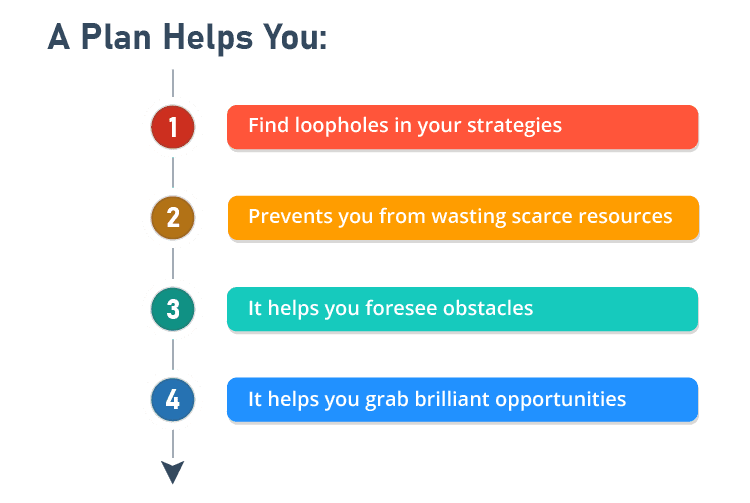If you have recently started your own business or are thinking of doing so, you might be overwhelmed by all the documentation you need to do. And it isn’t always clear why either which only adds to the confusion. One such document—and the most important one at that—is a business plan.
A business plan is the first document you create after you decide to set up your business. It is a roadmap to your business goals—highlighting the essentials needed to achieve them such as your marketing process, financial reports, customer analysis, operational plan, etc.
No matter the industry, every business has to face the volatility of its environment. Luckily, a business plan makes it easier to withstand these market fluctuations by helping you manage resources, maintain uniformity, and secure financial support.
What Is the Purpose of a Business Plan?
A business plan serves many purposes. At its core, it’s a guide to your business journey—encapsulating all areas of interest from the inside and out. With a personalized business plan set in place, you can do the following:
Let’s explore the Reasons Why You Need a Business Plan in detail.
1. Test the Practicality of Your Business Ideas
If you’re a new entrepreneur, you probably have a ton of ideas in mind for your business but are unsure of how to actualize them. This is where a business plan can help turn your ideas into real projects.
Since business plans are cohesive by design, they help you test out the practicality of your business ideas. It takes you through all the stages of running your business including the resources needed to get started and achieve short-term and long-term goals.
Doing so urges you to think rationally before starting your business venture. This way, you can save time and money by canceling out the ideas that only seem good in your imagination but are unrealistic, unviable, or too risky.
For instance, here are a few basic questions your business plan would cover:
- Which market segment(s) will you be catering to?
- What are the market pain points you are trying to solve?
- How will you solve it? What’s your product/service?
- Who are your target customers? What’s their profile?
- How much capital do you want to acquire and how?
2. Demonstrate Feasibility to Investors
Acquiring financial support is one of the biggest challenges of building a business. Whether it’s a bank or a venture capitalist, every investor wants to know the potential and feasibility of your business idea before putting their money into it.
This is precisely why investors require you to submit a business plan to answer all their queries. Your business plan acts as evidence that your business idea can survive the competition and risks of the market and generate good ROI.
3. Refine Business Strategies and Tactics
As mentioned before, your business plan is a roadmap designed to help you reach your business milestones. While writing a business plan, you formulate strategies, elaborate on how you plan to implement them, and mention when you will set them in motion.
A lot of research goes into creating this document. And in the process, you can identify and fix flaws and inconsistencies in your tactics. Doing this beforehand helps you avoid wasting scarce resources. It also helps foresee obstacles and prepare counteractive measures to overcome them.
4. Organize and Manage Business Activities
A business plan includes an in-depth explanation of your business activities and how you will manage them. The format of a business plan includes all the major activities of your company, including:
- Manufacturing
- Operations
- Marketing
- Pricing
- Sales
- Customer analysis
- Market analysis
- Finances
- Human resources
Your business plan serves as an instruction manual for you and your employees to refer to whenever there’s confusion. Having standardized procedures helps increase consistency and uniformity of operations—making sure things are done according to expectations.
A business plan acts as a guide for your team members in case of your absence.
5. Track Your Progress in Real-time
Writing a business plan helps you articulate your ultimate mission of starting your venture. Using the operations section of your business plan, you keep track of the progress you make toward achieving your current objectives via the metrics relevant to you.
This can include increased production, reduced wasteful expenditure, improved product quality, etc. This section also encompasses the roles your team members perform and how they contribute.
6. Reduce the Probability of Failure
Businesses fail due to numerous reasons. However, there are always examples out there to understand the common factors that can bring your business down to its last days. Some of the common reasons are:
- Lack of market
- Lack of financial stability
- Lack of competent team
- Lack of a robust business model
- Lack of USPs
A business plan covers sections that address all of these in-depth—making it easier for you to identify the risks that your business is subject to. Using these insights, you can equip yourself with the tools needed to safeguard yourself against potential failures.
7. Manage Finances
The success of a business is judged by its profitability—which, in turn, is dependent on how well you manage your financial assets. And while doing so is tricky, having a business plan makes the process less convoluted. The financial section of your business plan includes all the essentials of finance and accounting.
Your business plan provides a comprehensive picture of the following:
- Business model: It determines how you generate revenue.
- Cash flow: It states how much money enters and leaves your business.
- Assets: These include all the resources you own that can be cashed out.
- Liabilities: It covers what you owe to a creditor or other third party.
- ROI: It tells how much return your business generates for investors.
8. Build an Information Pool
Whenever you need to inform or brief your employees or contractors about a particular aspect of your business, you need a perfectly crafted error-free guide. But creating one for every context can be taxing. If you have a business plan, you can avoid this step.
A business plan is essentially a reflection of your entire business. It contains every detail of your company. This makes it easy for you to share particular parts of your business plan whenever it is necessary.
9. Stay Prepared for Critical Situations
Drafting a business plan pushes you to address the uncomfortable and challenging situations that may come your way in the future. Doing so ensures that you have a strategy set in place to deal with such situations.
This is essential because it is difficult to predict when a crisis can occur. However, it is possible to identify what these situations may look like.
While writing a business plan, you study various external and internal factors of your business, identify potential challenges, and tabulate them with a SWOT analysis. This will help develop contingent strategies to deal with predictable challenges.
10. Prepare an Exit
Your business plan not only helps you run your business but also helps you exit it when you need to. Many entrepreneurs plan a lot for starting their business but not enough of them plan for when they will need to liquidate their business or transfer the ownership.
You choose an exit strategy for reasons relevant to you. For instance, you might want to exit when you have successfully achieved your end business goals and want to focus on something else. Or, perhaps, you are selling your business to an acquirer.
Turn Your Ideas into Actions with a Business Plan
A business plan is an invaluable planning and management tool. It addresses and covers every step of setting up your enterprise, running it, and steering it toward your mission. Create a well-researched business plan for your company that serves all the above purposes.













